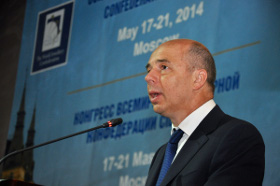Russian Finance Minister Anton Siluanov delivered the opening address of the 2014 CIBJO Congress 2014, which commenced this morning at the Russian Jewellery Guild in Moscow. Speaking to a crowd of 300 industry members, he paid tribute to the World Jewellery Confederation, and particularly to its work relating to the harmonisation of standards, promoting Social Corporate Responsibility and maintaining consumer confidence.
“CIBJO’s work is very important to the development of the international jewellery industry and we believe that it can also help the Russian jewellery trade as well,” said Mr. Siluanov. He said the Russian government was already discussing legislation relating to diamonds and coloured stones and that CIBJO standards could be included in the proposed laws.
In his address to the opening session, CIBJO President Gaetano Cavalieri vigorously defended the need for fairness in the jewellery industry. “CIBJO not only insists, but will do all that it can to ensure that the playing field in the jewellery sector remains level for all participants, be they large or small. We cannot accept a situation where the conditions for entry are artificially manipulated so that the cost of participation is restrictively expensive,” Dr. Cavalieri said.
“Our commitment to responsible business practices and Corporate Social Responsibility is absolute, and we insist that they be applied and implemented by all individuals and companies that are active in our business. But we refuse to accept a situation by which ethical and upstanding members of our trade are unable to compete fairly because that they cannot afford or are structurally unable to implement the systems that are imposed upon them,” he continued.
“There is a growing tendency of players in our industry, sometimes private companies, to lobby government and other international organisations to enact legislation or regulations that say are intended to protect the chain of distribution. These players represent themselves — not the industry as a whole and certainly not the international business. That is the role of elected representatives, like the national organisations and, by association, CIBJO.
Referencing a meeting that is scheduled to take place in Paris in several days time, where several industry members, most of whom represent larger companies, reportedly plan to discuss how the jewellery industry could contribute to establishing new OECD due diligence guidelines on precious stones, Dr. Cavalieri noted: “I would like to stress that CIBJO, as the leading representative of national associations from our industry around the world, should have been consulted. We were not. Neither were the African producing countries or Russia, which together represent almost 90 percent of world diamond production.”
“We do not have a problem with companies acting in their own interest but do we have a problem when it is in conflict with the general interest, which is the one that in the jewellery industry we democratically and legitimately represent, and in the diamond producing industry the African mining countries and Russia legitimately represents,” Dr. Cavalieri stated.
Although CIBJO understands and sympathises with the rationale of conflict mineral initiatives, it is important to point out that poorly conceived and improper legislation or regulations can be devastating, Dr. Cavalieri said.
“One of the consequences of the conflict minerals clause in the Dodd-Frank Act in the United States is companies avoiding legitimate gold producers in the Great Lakes region of Africa,” he said. “They avoid them because there are alternatives sources of supply, which are less cumbersome when it comes to Dodd-Frank compliance.
“Let me stress, those who are paying the steepest price for the ill-conceived legislation are not the jewellers, but the stakeholders. And they are people and entire communities living in some of the most economically under-developed areas of Africa,” said Dr. Cavalieri, who noted CIBJO’s commitment to the United Nations development programme as an organisation with special consultative status in the UN Economic and Social Council (ECOSOC).
“CIBJO has a voice, and it can and has been heard,” Dr. Cavalieri emphasised. In Europe, he reported, where there is a legislative effort underway to parallel Dodd-Frank, CIBJO’s EU Committee has had discussions in Brussels with the European Commission, and it appears that the law that will be passed by the European Parliament will have fewer unintended consequences than the one that was passed in the United States.
Speaking to the congress, Eli Izhakoff, CIBJO’s Honorary President, called on the confederation to initiate the creation of a common position among the leading industry organisations. “I have always found the unity is strength,” he said. “It is always easy to say ‘No’, but it is much more difficult to say ‘Yes’.”
Mr. Izhakoff called on the CIBJO President to meet with World Federation of Diamond Bourses President Ernest Blom; Maxim Shkadov, President of the International Diamond Manufacturers Association, and the newly elected President of the World Diamond Council, Edward Asscher.
“There is a division in the industry, and it is imperative that we bridge gaps. Hopefully, by the end of the World Diamond Congress
Dr. Cavalieri voiced his support for Mr. Izhakoff’s sentiments and proposal, and said that he would propose such a meeting to his WFDB, IDMA and WDC counterparts.
The CIBJO Congress, which will run through May 21, is the official gathering place for the World Jewellery Confederation’s Assembly of Delegates, and also the venue for the annual meetings of CIBJO’s sectoral commissions, where amendments can be introduced to the organisation’s definitive directories of international industry standards for diamonds, coloured stones, pearls, gem labs and precious metals, known as the Blue Books. Hosting the CIBJO Congress 2014 is the Russian Jewellers’ Guild.

